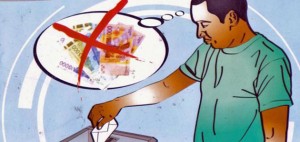Senegalese citizens voted in presidential elections yesterday after weeks of violent protests against incumbent President Aboulaye Wade’s effort to win a third term. Forum Civil, Transparency International’s chapter in the country has been working against the issues that threaten Senegal’s status as an established democracy. The following article was first published in the Huffington Post on 24 February.
In four days more than 5 million Senegalese voters will go to the polls. With 65 percent of the population under 30, many will be voting for the first time. This has been a sorry introduction to democracy: the incumbent 85-year-old president engineered a way around the Constitution to seek a third term, which sparked riots and violence. Popular singer Youssou N’Dour has been barred from running.
There has been little dialogue between the political parties and presidential hopefuls to end the violence and return to the peaceful political debate that should precede an election. If there was a case study on how not to run an election, this would be it. The young people of Senegal deserve better and, if we go back to basics, it may be that we can learn from these unfortunate events.
State violence towards citizens, political actors and journalists seriously threatens national stability and democracy. The right to protest is enshrined in the Senegalese constitution and the state’s responsibility is to protect citizens, not to assault them. This violence could have been avoided if Senegalese institutions had entered into dialogue with the people they claim to represent.
Four days from the presidential election in Senegal, such dialogue has been completely absent, and the next steps for our country are worryingly unclear. Senegalese citizens are being sidelined from the electoral process as the Ministry of the Interior bans anti-government protests. Read more.
















 Connect with us on Facebook
Connect with us on Facebook Follow us on Twitter
Follow us on Twitter